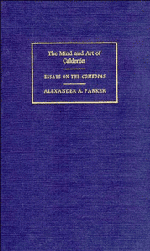Book contents
- Frontmatter
- Contents
- Author's preface
- Editor's preface
- Introduction
- I Stylistic and dramatic craftsmanship
- II From experience to myth
- III The tensions of social life
- IV The tensions of public life
- 18 The king as centre of political life
- 19 Religion and the state: La cisma de Ingalaterra
- 20 The issue of religious freedom
- 21 Religion and war: El príncipe constante
- 22 The drama as commentary on public affairs
- V From symbol to myth
- Epilogue
- Notes
- Index
21 - Religion and war: El príncipe constante
Published online by Cambridge University Press: 05 February 2012
- Frontmatter
- Contents
- Author's preface
- Editor's preface
- Introduction
- I Stylistic and dramatic craftsmanship
- II From experience to myth
- III The tensions of social life
- IV The tensions of public life
- 18 The king as centre of political life
- 19 Religion and the state: La cisma de Ingalaterra
- 20 The issue of religious freedom
- 21 Religion and war: El príncipe constante
- 22 The drama as commentary on public affairs
- V From symbol to myth
- Epilogue
- Notes
- Index
Summary
Part 3 of this book dealt with representative themes covering the problems of social living. These are problems affecting individuals; although most of them are universal in the sense that they can arise for all men at other periods in cultures that have, broadly speaking, similar mores and ethical standards. They are essentially problems of private lives. Other problems of moral and social living arise in the context of public life. All men have to live in this sphere, and all men can face the problems that can arise within it. The problems are mainly political, dealing with the relation of the individual to authority, either the authority of government, or the authority of the law. In the case of seventeenth-century Spain, there was another overriding authority, that of the Church. In Habsburg Spain it was not just the question of state religion; it was rather that Spain was, properly speaking, a ‘Religion State’, one in which the doctrines of the Church and her jurisdiction covered in theory the life of every individual, and if there was any conflict it governed the life of the individual in practice also. Religious belief and observance could be literally matters of life and death. Monarchy and government were as authoritarian as the Church, and no-one could be exempt from the sanctions of either.
One can speak of political plays in the output of Calderón only by broadening the range of the term in the way suggested by the outline given in chapter 18 to Saber del mal y del bien.
- Type
- Chapter
- Information
- The Mind and Art of CalderónEssays on the Comedias, pp. 288 - 311Publisher: Cambridge University PressPrint publication year: 1989



